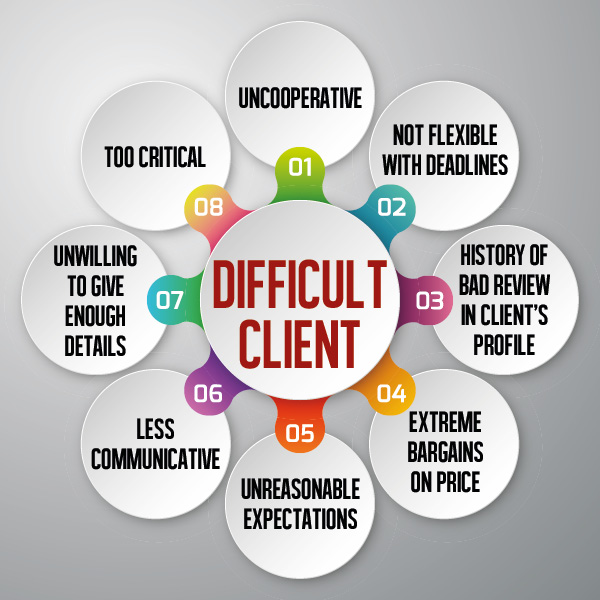The best way out of a difficulty is through it
Will Rogers Tweet
In my career as an independent writer, I have met some of the sweetest and most cooperative clients one can ever find. But when you are in the freelancing business and have effectively invested some energy there, it is normal that you will run over clients who are not simple to deal with.
Dealing with clients positively is a matter of patience and great understanding. It takes time to get hold of the right tactic, but once you unlock it, your business will grow much faster than you expected.
Who Are the Difficult Clients?
The first step that I took for dealing with difficult clients was identifying them. It was difficult to rule them out before starting the work, but here are some features that I found common in most difficult clients I have dealt with so far.

10 Ways of Effectively Dealing with Difficult Clients
1. Communicate more than often
Lack of communication is the foundation of a professional hazard. And especially if you are a freelancer, there is a fair chance that you will face some clients who are not responsive. Keep communicating even if you don’t get responded to. The messages can be kept for future reference.
Drop a message or request for a call whenever you need to, discuss anything that you think important, even if it is not something big. Also, if you are doing a long-term project, keep your client updated about the progress. This way you can avoid any blame later.
Related Posts:
2. Keep probing for details
In my experience of dealing with difficult clients, I have noticed that most of them are not clear about the work. They might give you some vague idea or topics that are not well thought-out and expect the work to be done perfectly. Emphasize on extracting details from the client. Keep questioning until you are satisfied and make it clear that the work cannot be started until both the parties have a clear idea of the deliverable. Set realistic goals beforehand to avoid confusion later.
3. Keep a record of the conversations
It is a primary requisite for a strong freelancing business. Keep the record of all the messages and conversations that you have had so far with the client. Do not delete any file or document that were exchanged between both the parties. In the unlikely event of a legal dispute, these pieces of evidence will have your back.
4. Don’t compromise on payment
Some clients may have an inclination towards getting the best work done but at the lowest price. Moreover, if you are a newcomer, you need to watch out for clients who are always in the mood for bargaining. They might give you reasons like you have not done much work earlier, or you don’t have a particular success rate, etc…
Before setting up your profile in the freelancing platform, make an extensive market research on what other freelancers with your skills and experience charge from clients. Once you have decided on your rates, do not alter it for clients excluding exceptions.
5. Clarify early
If you are not content with the way your business is running and are worried that your client isn’t getting the best out of you, address them about it as early as possible. Serenely clarify why an issue is keeping you from doing your best work or from meeting due dates – and how it will affect the outcomes for – alternatively, propose a superior method for working.
In the event that your client declines to tune in to your perspective and the venture closes formally, you will still have proof that you endeavoured to resolve the issues early.

6. Learn to say “no”
In the unforeseen event where it becomes too troublesome to meet the client’s expectations – or so disagreeable, that you simply would prefer not to meet them, the best strategy would be to send a short, well-mannered email clarifying that it is best you walk away. If required, explain your purpose behind doing as such, and offer your support till someone else is hired for the job.
7. Listen actively
Listen effectively, don’t just hear – active listening is one of the biggest strengths of a freelancer. Tune in to what the customer is truly saying. Figure out how to find some hidden meaning. When you listen with all your focus, you can comprehend the issue well. Try not to rush to solutions. Focus on exploring and brainstorming ideas with the client through active communication. Not only will it safeguard you, but it will also help in building a good working relationship and earn your client’s trust.
8. Be confident
As I mentioned earlier, it is not always possible to identify difficult clients beforehand. But as long as you are dedicated to your work and put in your best, you will always find a way to deal with a difficult client. Make sure –
- You are doing your research well
- You are communicating with the client often
- You are meeting deadlines
- You are quality-conscious
- You know you have done it well.
If you have done your part well, there is no need to worry. Even if the client turns out to be uncooperative, there is no way that you will get in a hassle.
9. File a dispute when needed
This is an extension of the above point. If you face a situation where the client disagrees to clear your dues, or raises a dispute that is unfair, go ahead and escalate this to the authorities. Once the legal team gets into investigating the matter, they will go through all the previous conversations and files history, and when it will be discovered that you have done your part well, the matter will automatically come in your favor. But noteworthy to mention here is that you are sure.
10. Utilize your past experiences
“Experience is the teacher of all things”. If you have ever dealt with a difficult client, you will know how the problems start. Assess your clients to see if there is anything that is common with people you worked with earlier. Trust your gut feeling, it works for me all the time. Make a mental note of the attributes that you think makes a client easy to work with, and focus on evaluating them accordingly.





